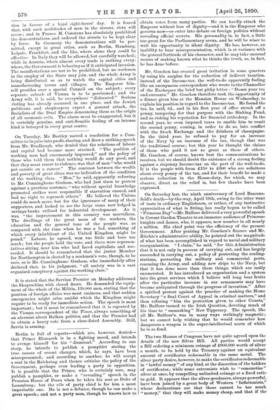On Tuesday, Mr. Bartley moved a resolution for a Com-
mittee to inquire into profit-sharing, and drew a striking speech from Mr. Bradlaugh, who denied that the relations of labour and capital had become more strained. "The position of working men bad enormously improved," and the policy of those who told them that nothing would do any good, and that they must resort to violence, was that of men "who would put caustic on a cancer." The contrast between the wealth and poverty of great cities was no indication of the condition of the working class. "Men," he said, apparently referring to Mr. Cunninghame Graham, who had just risen to protest against a previous sentence, "who without special knowledge promoted strikes were responsible if starvation ensued, and had no right to reproach others." He believed the Unions could do much more, but for the ignorance of many of their supporters, and looked to see the large sums now lodged in savings-banks utilised for industrial development. As it was, "the improvement in this country was marvellous. The dwellings of the great mass of the workers, the education and the general tone of the people was, as compared with the time when he was a lad, something of which every inhabitant of the United Kingdom might be proud." Labour, he agreed, won too little and bore too much ; but the people held the vote, and there were represen- tatives sitting near him who had faced capitalists and suc- ceeded. It should be remembered that the junior Member for Northampton is elected by a workmen's vote, though, to be sure, so is Mr. Cunninghame Graham, who immediately after declared that, in his judgment, "all society was in a vast organised conspiracy against the working class."


































 Previous page
Previous page